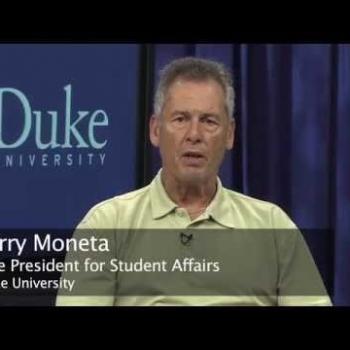Dear Dr. Griffiths,
One of my deepest regrets from my time as a Duke Divinity student was that I never took a course with you. Two of my favorite theologians I have discovered in the past several years after seminary are Henri de Lubac and Hans Urs Von Balthasar. Von Balthasar in particular can be difficult for me to comprehend fully and I would have benefited from your guidance. I’m writing you because my heart is broken by the dirty laundry from my beloved alma mater that has been strewn all over the Internet this week. I’m asking you to consider what you can do to bring this story to a redemptive, Christ-centered ending.
I understand your concern with institutional trainings taking time away from academic work. I currently work as a chaplain at Tulane University which is very similar to Duke in many ways. We have a bloated administration that has a similar taste for trainings that seem like a waste of my time not because I don’t care about suicide prevention or bullying or sexual violence, but because the material is often redundant and commonsensical. I don’t come away from it feeling inspired to create a more loving, conscientious community. I can’t get past whatever cheesy acronym they’ve decided to use in order to get the grant funding for the position of the bureaucrat who’s giving the training.
So I understand your skepticism about Duke Divinity School offering an anti-racism training (whose actual efficacy I can’t speak for one way or another). My concern is with the way that you expressed yourself. Now that Rod Dreher has published all the documents from your case, you don’t come out very well. One of your current students whom I know has loved your classes and is dismayed and demoralized by your comments. You’ll notice that I didn’t write this letter to Paul. I wrote it to Dr. Griffiths. Since I’m expressing criticism of you, it’s very important that I communicate as respectfully as possible. When you referred to Dr. Portier-Young as Thea, you were starting off on the wrong foot if in fact you were seeking to speak persuasively. I’m wondering if this is a case in which you should have slept on it before hitting send. According to the timeline Rod Dreher provided, you responded to the email the same day, which suggests to me that it was the kind of impulsive response that I’ve been guilty of many times.
About the anti-racist trainings, you write:
I exhort you not to attend this training. Don’t lay waste your time by doing so. It’ll be, I predict with confidence, intellectually flaccid: there’ll be bromides, clichés, and amen-corner rah-rahs in plenty. When (if) it gets beyond that, its illiberal roots and totalitarian tendencies will show. Events of this sort are definitively anti-intellectual. (Re)trainings of intellectuals by bureaucrats and apparatchiks have a long and ignoble history; I hope you’ll keep that history in mind as you think about this instance.
For anyone reading this quickly who isn’t already locked into the ideological assumptions of your amen corner, the message is that you believe anti-racism is anti-intellectual. As such, that comes across as not being an attack on ineffectual bureaucracy but on the scholarly work of several of your colleagues and on the personhood of your students of color. I’m confident that you intended nothing of the sort, but now these words are out of your hands and being examined by thousands of eyes who read quickly through dozens of articles every day on the Internet.
I wouldn’t have known based on your disparaging comments here that you had signed onto the Statement of Catholic Theologians on Racial Justice in December 2014, in which you were one of 456 Catholic theologians who pledged to “examine within ourselves our complicity in the sin of racism and how it sustains false images of White superiority in relationship to Black inferiority.” I’m curious why you signed this statement if you think that creating a space for racial self-examination is a waste of time.
I’m guessing that if we had a more extended conversation, you would explain that your issue was not with racial self-examination as such but with a particular approach to the conversation that involves shaming and indoctrination. In any case, you have accomplished creating precisely the kind of anti-intellectual space you were protesting. The comment section of the American Conservative article covering your story is filled with bromides, cliches, and oversimplified narratives about the scourge of political correctness in academia which is completely unjust to your colleagues at Duke.
By lashing out at a junior female colleague in a mass email, you created an authority crisis for the new female dean. While I don’t think you intended your words to convey racism, sexism, or bigotry, Dean Heath’s response reveals the need to stick up for your female and non-white colleagues. Thomas Pfau suggests in his email that you were voicing the views of other faculty who weren’t in a position to comment publicly. What if it’s also the case that some of your colleagues have felt bullied by you in other contexts (such as faculty meetings over the past two years) without you realizing it and Dean Heath’s response to you was the product of being pressured by your colleagues who needed someone to stand up to you? How many more faculty members might she have lost to Yale or Princeton if she hadn’t responded forcefully?
I only have your side of the story to go by regarding the disciplinary proceedings. Maybe they are an overreaction. Maybe they are indicative that two women do not feel safe communicating with you outside of official administrative channels. Your refusal to meet directly with Dean Heath continues to exacerbate her authority crisis. What’s so tragic about all of this is that she’s utterly not a social justice warrior. She’s a student of contemplative spirituality, someone with whom you could have had very rich and beautiful conversations if the circumstances were different. I was so excited when she was appointed as the new dean because her passion is spiritual formation,something which is part of Duke’s seminary culture but could be greatly expanded upon. Her work at Perkins creating neomonastic community has been groundbreaking. I am part of creating a similar community for young adults in New Orleans. It’s exactly the kind of movement within United Methodism that ought to make a Catholic theologian smile.
According to the Duke Divinity School Conduct Covenant by which you are bound as a faculty member, “Those who claim Christ speak and live truthfully. We are called to show respect to all we meet, acknowledging in our daily behavior on and off the campus that we are called to live in the image of God. We work to strengthen one another in Christ. We are welcoming and hospitable, endeavoring to create a place where all will feel safe and free to share joys and struggles, passions and conflicts, hopes and fears.” Can you honestly say that everything about the way you have conducted yourself is in conformity with this covenant’s commitment to respect and hospitality that isn’t political correctness but a biblical mandate throughout the millennia of our tradition? Are you confident that you have no need of reconciliation regarding any aspect of your conduct before celebrating the sacred mysteries of the Eucharist?
In your open letter protesting the disciplinary proceedings, you write: “What I’ve argued in these contributions may of course be wrong; that’s a feature of the human condition.” Ignatius of Loyola would slap you in the face for that contortion of Catholic spirituality. The human condition is not an excuse for being unrepentant; it is why we need to partake of the sacrament of reconciliation often. It is why we need to examine ourselves deeply so that we do not become spiritual cancer in the body of Christ. There is nothing more beautiful than repentance. In a world of self-righteous ideology, the act of humbling yourself and publicly owning responsibility for your part of a conflict is the bravest witness you can put forward of a radically different way of life. You have the power to change the narrative to one of redemption, healing, and hope.
In Hans Urs Von Balthasar’s Love Alone is Credible, he writes, “The genuine saints desired nothing but the greater glory of God’s love; this alone is the condition of possibility of what they do.” Far too often, I have sought to win arguments rather than live to promote the greater glory of God’s love. I am a sinner, and I need to repent daily so that I may be transformed from one degree of glory to the next. Consider whether how you have represented God by your actions is indeed ad majorem dei gloriam. If you are convicted that the church needs to defend itself against an invasion by secular humanist political correctness, then the best witness you can offer for your views is for your charity to be entirely above reproach. As the apostle Paul says, all the most erudite theology in the world is just a clanging gong if we lack charity in how we conduct our daily conversations. Please do your part to turn this disaster into a story of reconciliation that will give hope to aspiring ministers in a deeply divided church.
Yours in Charity,
Rev. Morgan Guyton












